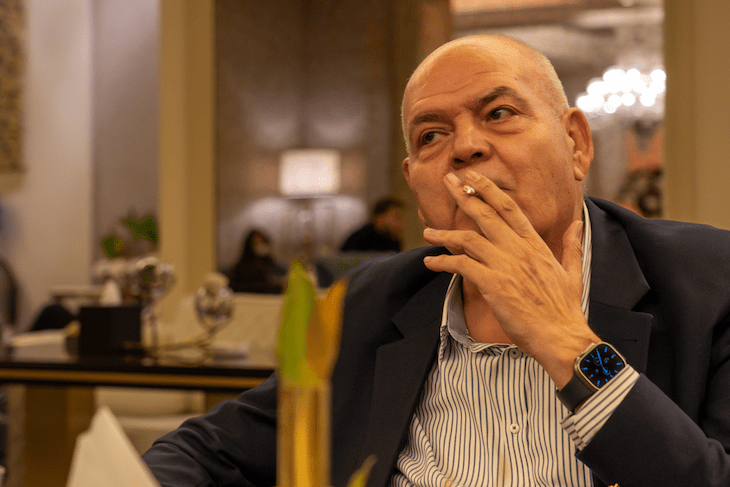Amr Salem mingles cheerfully with foreign investors and members of Syria’s interim government in a five-star hotel in Damascus, and why not? Salem’s disposition, clothing, and manners fit the scene. Yet Salem was, in fact, a minister in Bashar al-Assad’s regime and the officials he warmly greets are members of Hayat Tahrir al-Sham (HTS), with whom the regime fought a brutal 14-year-long civil war. When Assad fled Syria last month, many of his officials escaped the country too. But not Salem.
Salem chooses his words carefully, portraying himself as a patriot who loyally served his country from the inside
‘Bashar was my friend,’ Salem states firmly. ‘I think he really liked me. But he betrayed me, even though he didn’t do anything to [physically] harm me. Only financially. And he banned me from leaving the country for 13 years.’
Salem chooses his words carefully, portraying himself as a true patriot who loyally served his country and fought corruption from the inside. His image-building appears successful. ‘HTS sent somebody to me two days after the collapse just to say: “Minister, we know who you are, don’t worry,”’ he notes with satisfaction.
Long before the civil war, Salem worked for Microsoft and lived in Switzerland for five years. In the 1990s, he advised Basel al-Assad, Bashar’s older brother, who was being groomed to take over from their father. But Basel died in a car accident in 1994. Bashar, training to be an ophthalmologist in London, was called back to Syria to take his brother’s place. After becoming president, Bashar also called on Salem’s services, appointing him as an advisor in 2005 and Minister of Communications and Technology the following year. He fell out of favour and was banned from travelling, but was called back to serve as Internal Trade and Consumer Protection Minister from 2021 to 2023.
In Salem’s words, both early dismissals from the ministries were due to his relentless efforts to fight corruption, and his conflicts with the formidable intelligence services. He has an endless collection of lengthy anecdotes, in all of which he appears as a down-to-earth man of the people doing his best to improve life for average Syrians or clashing with the most dangerous people in the regime.
Corruption was an intrinsic part of the Assad regime. Getting anything sorted included bribes at both low and high levels. While officers and oligarchs filled their pockets and built mansions, the footsoldiers collected cash and packets of red Marlboro at the military checkpoints from every driver.
‘I even said it publicly as a minister: I don’t care about the small corrupt people because they do not have money to eat,’ Salem says. ‘What I care about is the big corrupt people. If someone cannot satisfy their basic needs, I cannot ask them to be an angel.’
He claims he never got his hands dirty, and that his supposedly considerable wealth comes from his Microsoft shares in the US. Yet most Syrians find it difficult to believe that any member of the Assad government, let alone a minister, was not benefitting from the rotten system.
Before the regime’s collapse, the Syrian economy was in a parlous state. The monthly salary of an engineer in public employment was around 400,000 Syrian Pounds, the equivalent of £25. The situation was similar for low-ranking members of the security forces. When the rebels launched their lightning attack in December, soldiers fled from their posts without a fight. Their rumbling stomachs proved stronger than the fear of their superiors. Reinforcements often never arrived, as drivers syphoned off and sold the fuel from armoured vehicles. In Salem’s view, poverty was the decisive factor in the downfall of Assad, more than the military ability of the rebels or foreign interference.
As sanctions linger on, poverty poses a similar challenge to the new government. One month after the regime change, thousands of people gathered in Damascus on 10 January. Many came for the Friday prayer and to celebrate, but countless others came for the food handed out for free: small plastic bowls of rice and chicken. The crush at the food tent turned to panic, then a stampede. To reimpose control, militiamen started shooting in the air, exacerbating the situation. Four women died in the chaos that day, and many others were injured.
When it comes to Assad’s complicity and awareness of what was happening, Salem’s account is more ambiguous
‘I do not fear a new civil war,’ Salem says. ‘A civil war is between people of different religions or ethnicity. But I think we’ll have a war of the poor, like the French Revolution.’ Though he is optimistic about the new government’s general direction, on the economy he strongly criticises them: ‘They laid off 300,000 public employees because they have no need for them. This is 300,000 families, five people each on average. You cannot run all of Syria based on your experience in Idlib – it is a small town.’
When it comes to Assad’s complicity and awareness of what was happening, Salem’s account is more ambiguous. ‘The president was too naive,’ he reflects. ‘The intelligence surrounded him, and they knew how to deal with him. At the time, I thought he was totally kept in the dark by them. And I think that, to a certain extent, is true, up until the war. I got convinced that he was personally corrupt in 2022.’
Though Salem is still on the EU’s sanction list, he is certain it will be lifted soon. As for the UK, he believes he would be granted a visa even now if he applied. His daughter has British citizenship and works as a research fellow in Oxford.
He has no intention of contacting Assad since he fled to Russia, he says. Though he could if he wished. ‘Why would I do that? If I were him, I would have preferred to stay and die. This is your country and you leave it like this?’







Comments